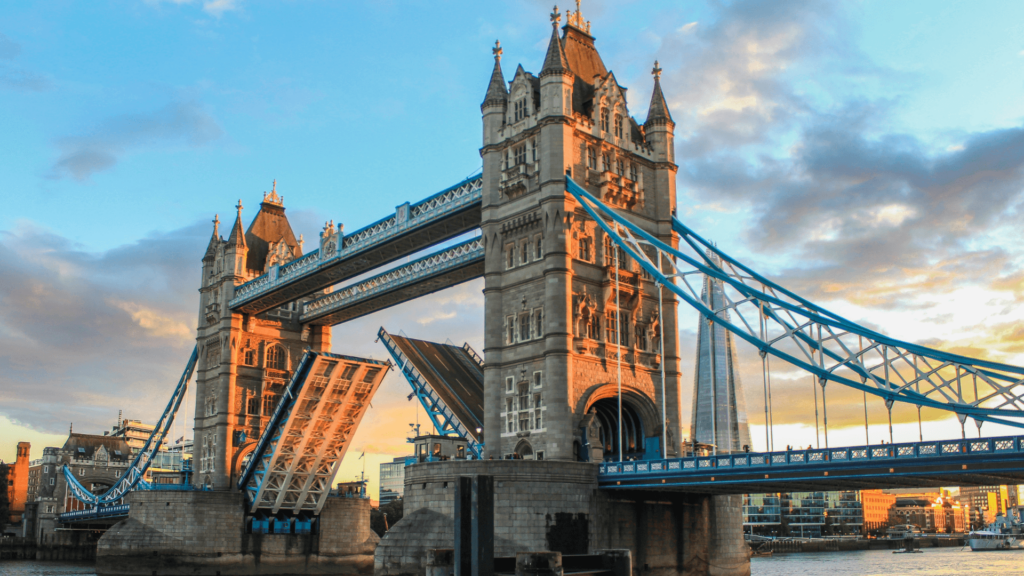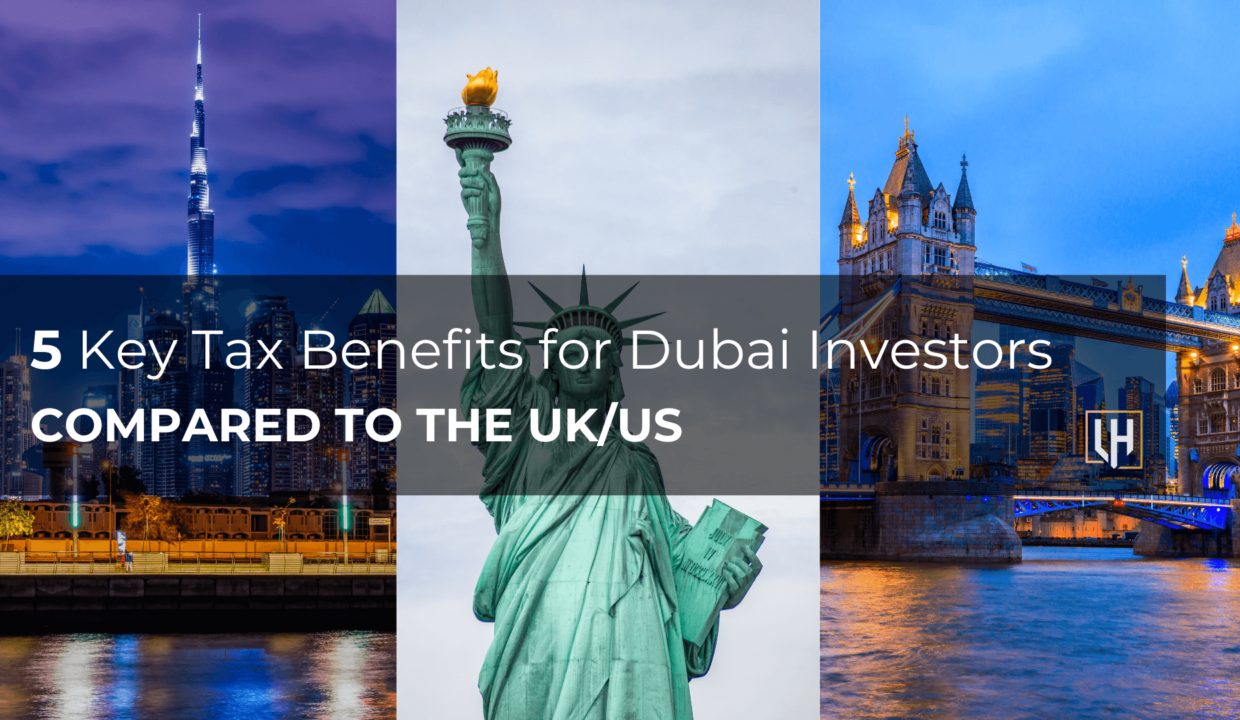5 Key Tax Benefits for Dubai Investors Compared to the UK/US
Dubai has long been regarded as a global business hub due to its strategic location, modern infrastructure, and thriving economy. However, one of the most compelling reasons investors flock to this city is the extremely favorable tax environment. Dubai’s tax structure offers several advantages when compared to countries like the UK and the US. From personal income tax exemptions to corporate tax benefits, the city stands out as an investor-friendly destination. Below, we’ll explore the top five key tax benefits for Dubai investors compared to the UK and the US.
1. No Personal Income Tax
One of the most attractive features of Dubai for investors is the absence of personal income tax. In Dubai, individuals are not taxed on their earnings, whether from employment, investments, or other sources of income. This is a stark contrast to the UK and the US, where high-income earners pay a significant portion of their earnings in taxes.
In the UK, income tax rates can go up to 45% for earnings above £150,000, while in the US, federal income tax rates range from 10% to 37%, depending on income brackets. This doesn’t include state or local taxes, which can increase the total tax burden significantly. For instance, residents of California can face state income tax rates as high as 13.3%, bringing their total tax burden to an even higher level.
In Dubai, however, this high tax burden is absent. The lack of income tax allows investors to retain more of their earnings and reinvest them, thus helping wealth accumulation and reducing the overall cost of living for high-net-worth individuals and entrepreneurs. This is particularly beneficial for those who receive dividends, capital gains, and other forms of passive income from their investments. The ability to keep 100% of your income can be a game-changer when it comes to long-term wealth building.
2. Corporate Tax Benefits
Dubai’s tax regime is also advantageous for businesses and corporations. Although Dubai introduced a corporate tax of 9% on profits exceeding AED 375,000 in June 2023, this rate is still one of the lowest in the world, especially when compared to the US and UK. In the UK, corporate tax rates stand at 19% for companies with profits up to £250,000, and 25% for larger companies. In the US, businesses face a federal corporate tax rate of 21%, with additional state-level taxes that vary by location. In some states like New Jersey, corporate tax rates can exceed 30%.

The introduction of the corporate tax in Dubai is still quite favorable when compared to the rest of the world. Moreover, Dubai offers many tax exemptions, particularly in its free zones. Many industries, such as technology, real estate, and manufacturing, can benefit from zero tax rates in these free zones, creating an attractive business environment for both domestic and foreign investors. This low corporate tax structure allows businesses to maximize their profits, reinvest in their operations, and expand their presence in the market.
3. No Capital Gains Tax
Another key benefit of investing in Dubai is the lack of capital gains tax. In Dubai, investors are not taxed on profits made from the sale of assets like real estate, stocks, or bonds. This tax-free environment encourages buying and selling investments without the worry of a large portion of the profits being taken away by the taxman.
In contrast, both the UK and US impose capital gains tax on profits from the sale of assets. In the UK, the capital gains tax rate can be as high as 28% for residential property, while in the US, long-term capital gains are taxed at rates of 0%, 15%, or 20%, depending on income levels. In addition, the US has a complex set of rules regarding the taxation of investments and may also impose additional taxes on specific asset types, such as real estate.

For Dubai investors, the absence of a capital gains tax means more profit from asset sales. This is particularly beneficial for real estate investors, as Dubai’s property market has been steadily growing. Investors can buy properties, hold them for a few years, and then sell them at a profit without worrying about hefty tax bills cutting into their returns. This policy makes Dubai an ideal location for investors looking to build and grow their portfolios.
4. No Inheritance or Estate Tax
Wealth preservation is a top priority for many investors, and one of the key tax advantages Dubai offers is the absence of inheritance or estate taxes. In Dubai, assets passed on to heirs are not subject to tax, ensuring that the wealth built over a lifetime can be preserved for future generations without being eroded by taxes.

In contrast, both the UK and the US impose inheritance or estate taxes, which can take a significant portion of the estate value. In the UK, inheritance tax is charged at 40% on estates valued over £325,000, which can reduce the wealth passed on to heirs substantially. In the US, the federal estate tax applies to estates valued over $12.92 million (2023), with rates starting at 18% and going up to 40%. Additionally, many states in the US impose their own estate or inheritance taxes, adding another layer of complexity to the wealth transfer process.
Dubai’s tax-free inheritance policy offers peace of mind to investors, knowing that their wealth will pass to their heirs intact. This makes it an attractive destination for high-net-worth individuals looking to secure their family’s financial future.
5. VAT and Other Indirect Taxes
Dubai has a VAT system in place, but it is relatively modest, set at 5%. While this applies to most goods and services, it is significantly lower than the VAT or sales tax rates in the UK and US. In the UK, the standard VAT rate is 20%, while in the US, sales tax rates range from 6% to 10%, depending on the state.
For investors in Dubai, the lower VAT rate means that they pay less on their business-related purchases, which can lead to reduced operating costs. This is particularly advantageous for businesses that deal with high-value goods or services. In comparison, businesses in the UK and US may face higher costs due to VAT or sales tax, which can eat into their profit margins.

Furthermore, Dubai’s taxation system is relatively straightforward and transparent, reducing the administrative burden on investors and businesses. In both the UK and US, the tax systems can be complex, with various deductions, exemptions, and credits to navigate. This complexity often leads to higher compliance costs and the need for professional tax advice.
Conclusion
Dubai’s tax policies make it an attractive destination for investors seeking to maximize their returns and build wealth. The absence of personal income tax, low corporate tax rates, lack of capital gains tax, and the absence of inheritance or estate taxes provide significant advantages compared to the tax systems in the UK and US. Additionally, Dubai’s low VAT rate and simplified tax structure make it an ideal location for both individuals and businesses looking to thrive in a tax-efficient environment.
For investors considering global opportunities, Dubai offers a clear financial advantage, providing a tax-friendly environment that promotes wealth accumulation and long-term success. With its growing economy, robust infrastructure, and favorable tax policies, Dubai remains a top choice for those seeking to make the most of their investments.


